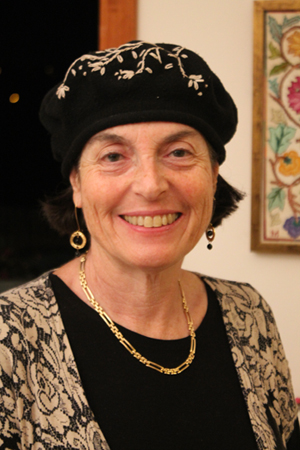
Iris Mandel
Iris Mandel teaches English for native speakers at Ulpanat Amana, a private girls’ high school in Kfar Saba, Israel. She taught in Cleveland, Ohio, for 10 years and is now in her 22nd year at Ulpanat Amana.
Mandel assigned her 10th grade class (10 students) USC Shoah Foundation’s IWitness Video Challenge as summer homework. The IWitness Video Challenge invites students to be inspired by the testimonies of survivors of the Holocaust and other genocides contained in the interactive, educational website IWitness. The testimonies are part of USC Shoah Foundation's Visual History Archive, which contains 52,000 testimonies from 57 countries in 33 languages. Students are asked to create positive value in their communities by doing something ordinary (or extraordinary), and then challenged to build a video telling the story about how they contributed to making their communities a better place. This was Mandel’s first time assigning the challenge and her first time using USC Shoah Foundation’s testimonies in the classroom. There is also an IWitness Video Challenge essay contest currently underway for students in the US and Canada.
Why did you want your students to complete the IWitness Video Challenge?
Last spring the Jerusalem Post ran an article about IWitness and it really struck a chord with me. How clever! It not only recognizes the anniversary of Schindler’s List, but encourages the next generation to view the testimonies and be part of a fun contest, all while doing some sort of mitzvah...challenging, engaging, and community-minded....I must do this! After I showed the class the sample videos, they started to get excited. Of course my own enthusiasm rubbed off on them, too! I could see their minds already working on what project they could do.
What do you think about the videos your students created?
After viewing them, I was teary- eyed and I applauded them. It was not because they were so professional. It was because these girls spent part of their summer vacation doing a good deed for someone. They totally connected with the goal and proved to me and to themselves that time spent caring for others is time well-spent. I told them that, sure, it is important to learn to read and write, but real education is what they just showed me. That is education for life! Among their ideas were cooking a Shabbat meal (from soup to nuts) for a needy family and delivering it anonymously to their door, baking cookies for Israeli soldiers and delivering them to their base, and becoming a big sister to a little girl whose father had recently died (this became weekly outings and will continue throughout the year).
Do you have any other plans for the videos?
Our principal requested the videos also be in Hebrew so they could be shared with the general school population. He plans on using them in either December for the tenth of Tevet fast assembly or in April for Holocaust Memorial Day.